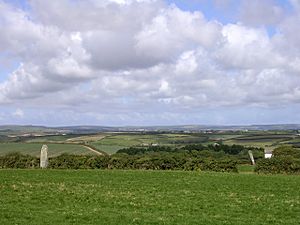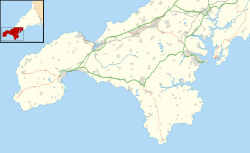The Pipers, St Buryan facts for kids
 |
|
| Location | St Buryan |
|---|---|
| Coordinates | 50°04′06″N 5°35′06″W / 50.068338°N 5.585082°W |
| Type | Standing stones |
| History | |
| Periods | Neolithic / Bronze Age |
| Cultures | Cornish |
The Pipers are two tall, ancient stones standing in a field in Cornwall, United Kingdom. They are close to another famous stone circle called The Merry Maidens. These mysterious stones are about 3 kilometers (2 miles) south of the village of St Buryan. They are known as standing stones because they stand upright, placed there by people long ago.
Contents
What Do The Pipers Look Like?
The two stones are lined up in a special way, from northeast to southwest. This line points almost directly towards The Merry Maidens stone circle. The stones are in separate fields, about 90 meters apart from each other.
The Southwest Stone
The stone on the southwest side is the taller of the two. It stands about 4.7 meters (over 15 feet) high. You can see two long cracks running down its northwest side. There is also one crack on its southeast side.
The Northeast Stone
The stone on the northeast side is a bit shorter, standing about 4.2 meters (nearly 14 feet) high. This stone has a rectangular shape. It leans slightly towards the northwest.
Legends About The Pipers
The name "The Pipers" comes from old stories and legends. These tales help us imagine what people believed about these stones long ago.
The Pipers and The Merry Maidens
One popular legend says that The Pipers were once two musicians. They were playing music on a Sunday, which was called the "Sabbath" and considered a day of rest. They were playing for the nearby dancing Merry Maidens. As a punishment for playing music on the Sabbath, both the pipers and the dancers were turned into stone.
The Battle of The Pipers
Another legend tells a different story. It says that these two stones were put up after a big battle in the 10th century. In this battle, the Anglo-Saxon English, led by King Æthelstan, fought against the Cornish Celts. The Cornish were led by a person named Howel and had help from the Danes. According to this story, The Pipers marked the exact spots where the two opposing leaders stood during the battle.
Who Studied The Pipers?
People have been interested in The Pipers for a long time. The first person to write about these stones was William Borlase. He recorded them in the year 1754. Later, in 1871, his descendant, William Copeland Borlase, dug around the stones to see if he could find anything. However, his digging did not uncover any new information about them.
 | Sharif Bey |
 | Hale Woodruff |
 | Richmond Barthé |
 | Purvis Young |


